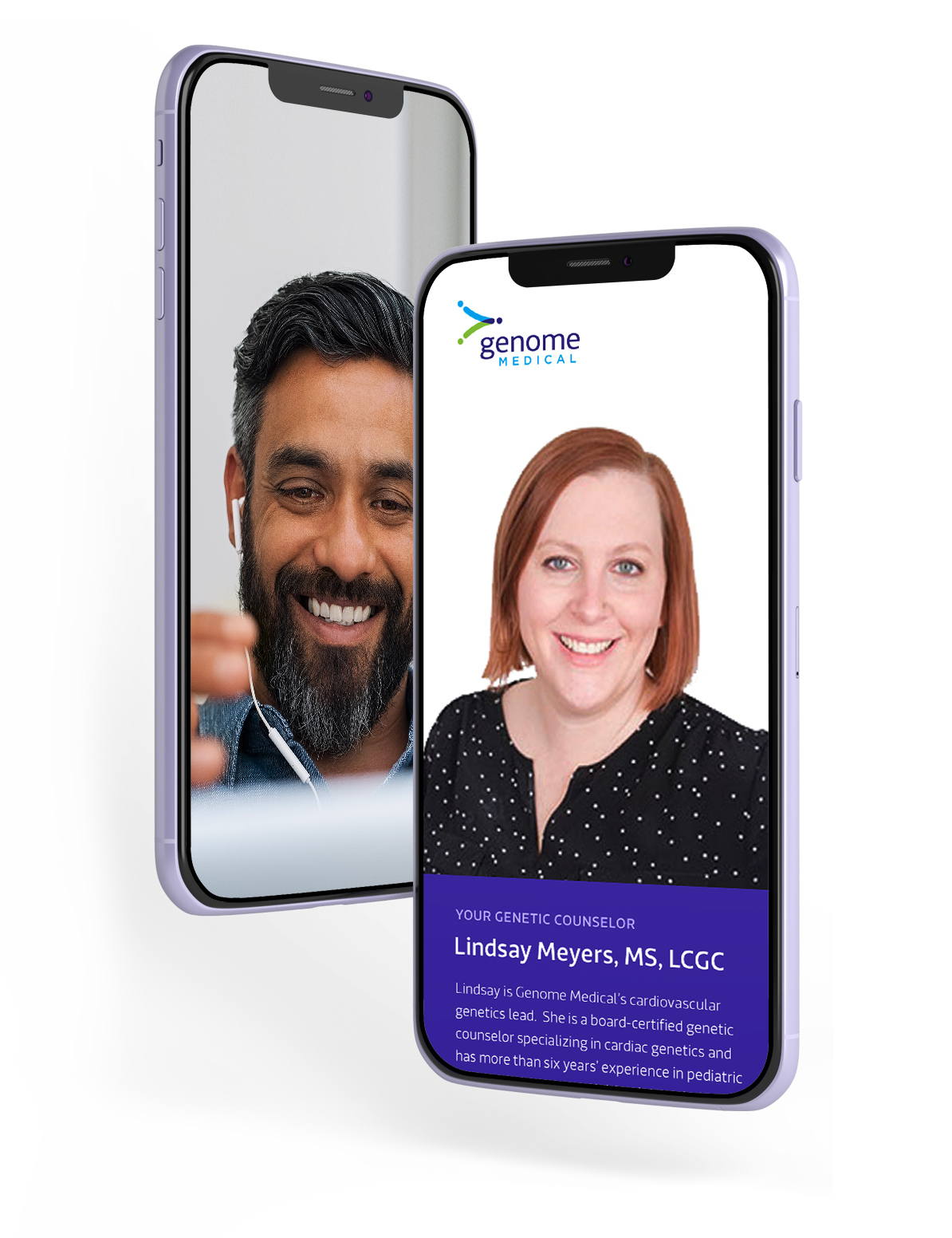If you’re pregnant or looking to become pregnant, genetic screening and diagnostic testing can give you and your doctors insight into your baby’s health. Scroll down to learn what genetic screening and diagnostic testing options exist prior to and during pregnancy.
Genetic Screening and Diagnostic Testing in Pregnancy
Genetic Screening and Diagnostic Testing in Pregnancy
If you’re pregnant or looking to become pregnant, genetic screening and diagnostic testing can give you and your doctors insight into your baby’s health. Scroll down to learn what genetic screening and diagnostic testing options exist prior to and during pregnancy.
Genetic Testing
Before Pregnancy
Preconception genetic testing, also known as carrier screening, is a test that analyzes a person’s DNA to see if they are a carrier for a genetic condition. Carrier screening can be performed on a blood sample, saliva sample, or buccal (cheek) swab. Ideally, carrier screening is conducted prior to pregnancy, but screening can also be done during the first and second trimesters.
Carriers of genetic conditions are typically healthy and often do not know they are carriers. If both parents are carriers of the same genetic condition, or in some cases if just the biological mother is a carrier, then there would be an increased risk for their baby to be affected.
This cost does not include genetic testing. Any genetic testing will need to be paid for separately. Learn more about insurance coverage for genetic counseling and genetic testing.
Genetic Testing
During Pregnancy
- GS will assess certain factors to determine if a pregnancy is at an increased or decreased risk for a particular genetic or chromosome condition. It will not provide a definitive yes or no answer.
- DT will provide a definite yes or no answer regarding whether or not a pregnancy is affected with a given condition.
- All GS and DT options are optional.
Learn more about prenatal genetic testing.
Genetic Screening During the First Trimester
Carrier Screening
If not conducted prior to pregnancy, carrier screening can be done at this time.
NIPT
Also known as non-invasive prenatal testing, non-invasive prenatal screening (NIPS) or cell free fetal DNA, this option screens for common chromosome conditions, including trisomy 21 (Down syndrome), trisomy 18, and trisomy 13. Sex chromosome conditions and microdeletions can also be included as part of the analysis. This screen is done after 10 weeks gestation and requires a maternal blood sample.
First Trimester Screening
This screen assesses for Down syndrome, trisomy 18 and trisomy 13. Done between 11 and 13 weeks gestation, the measurement of two pregnancy-related hormones obtained from a maternal blood sample are combined with two ultrasound measurements to calculate these risks.
Integrated Screening
This screen assesses for Down syndrome, trisomy 18 and open neural tube defects (like spina bifida). The first part is done between 11 and 13 weeks gestation, during which the measurement of a pregnancy-related hormone is obtained from a maternal blood sample and two ultrasound measurements are recorded. This is followed by the measurement of four pregnancy-related hormones obtained from a maternal blood sample between 15-20 weeks of pregnancy. A final test result is provided at that point.
Sequential Screening
Similar to the Integrated Screen, this screen assesses for Down syndrome, trisomy 18 and open neural tube defects. The patient is given a preliminary risk estimate after completion of the first-trimester analyte and ultrasound screening. If the first-trimester screening result indicates that the risk of a chromosome condition is greater than the laboratory-derived positive screening cutoff, the patient is offered a DT or cell-free DNA screening, and the screening protocol is discontinued. If the patient has a lower risk than the cut-off level, she is informed that she has received a negative screening test result and pursues the second blood draw between 15-20 weeks gestation, after which a final result is provided.
Genetic Screening During the Second Trimester
Carrier Screening
If not conducted prior to pregnancy or in the first trimester, carrier screening can be done at this time.
Second Trimester Screening
This screen assesses for Down syndrome, trisomy 18 and open neural tube defects. Done between weeks 15 and 20 weeks, four pregnancy-related hormones are measured from a maternal blood sample. This is not recommended if you have previously pursued either cell-free fetal DNA or first trimester screening.
Alpha-Fetoprotein (AFP) Test
This screen assesses for neural tube defects. It is done between weeks 15 and 20 weeks and measures a single pregnancy-related hormone measured from a maternal blood sample. It is recommended for women who have previously pursued either cell-free fetal DNA or first trimester screen.
A Targeted (or Detailed) Ultrasound
This screen uses sound waves to assess the baby’s anatomy and development. It is typically done between 18 and 20 weeks gestation.
Diagnostic Genetic Testing during Pregnancy
Chorionic villi sampling (CVS)
A small sample of placental tissue (chorionic villi) is obtained either transcervically or transabdominally under ultrasound guidance between 11-13 weeks of gestation.
Amniocentesis (amnio)
A small sample of amniotic fluid is removed by placing a needle into the amniotic cavity under ultrasound guidance after 16 weeks gestation.
Genetic Testing
During Pregnancy
- GS will assess certain factors to determine if a pregnancy is at an increased or decreased risk for a particular genetic or chromosome condition. It will not provide a definitive yes or no answer.
- DT will provide a definite yes or no answer regarding whether or not a pregnancy is affected with a given condition.
- All GS and DT options are optional.
Learn more about prenatal genetic testing.
Genetic Screening During the First Trimester
Carrier Screening
If not conducted prior to pregnancy, carrier screening can be done at this time.
NIPT
Also known as non-invasive prenatal testing, non-invasive prenatal screening (NIPS) or cell free fetal DNA, this option screens for common chromosome conditions, including trisomy 21 (Down syndrome), trisomy 18, and trisomy 13. Sex chromosome conditions and microdeletions can also be included as part of the analysis. This screen is done after 10 weeks gestation and requires a maternal blood sample.
First Trimester Screening
This screen assesses for Down syndrome, trisomy 18 and trisomy 13. Done between 11 and 13 weeks gestation, the measurement of two pregnancy-related hormones obtained from a maternal blood sample are combined with two ultrasound measurements to calculate these risks.
Integrated Screening
This screen assesses for Down syndrome, trisomy 18 and open neural tube defects (like spina bifida). The first part is done between 11 and 13 weeks gestation, during which the measurement of a pregnancy-related hormone is obtained from a maternal blood sample and two ultrasound measurements are recorded. This is followed by the measurement of four pregnancy-related hormones obtained from a maternal blood sample between 15-20 weeks of pregnancy. A final test result is provided at that point.
Sequential Screening
Similar to the Integrated Screen, this screen assesses for Down syndrome, trisomy 18 and open neural tube defects. The patient is given a preliminary risk estimate after completion of the first-trimester analyte and ultrasound screening. If the first-trimester screening result indicates that the risk of a chromosome condition is greater than the laboratory-derived positive screening cutoff, the patient is offered a DT or cell-free DNA screening, and the screening protocol is discontinued. If the patient has a lower risk than the cut-off level, she is informed that she has received a negative screening test result and pursues the second blood draw between 15-20 weeks gestation, after which a final result is provided.
Genetic Screening During the Second Trimester
Carrier Screening
If not conducted prior to pregnancy or in the first trimester, carrier screening can be done at this time.
Second Trimester Screening
This screen assesses for Down syndrome, trisomy 18 and open neural tube defects. Done between weeks 15 and 20 weeks, four pregnancy-related hormones are measured from a maternal blood sample. This is not recommended if you have previously pursued either cell-free fetal DNA or first trimester screening.
Alpha-Fetoprotein (AFP) Test
This screen assesses for neural tube defects. It is done between weeks 15 and 20 weeks and measures a single pregnancy-related hormone measured from a maternal blood sample. It is recommended for women who have previously pursued either cell-free fetal DNA or first trimester screen.
A Targeted (or Detailed) Ultrasound
This screen uses sound waves to assess the baby’s anatomy and development. It is typically done between 18 and 20 weeks gestation.
Diagnostic Genetic Testing during Pregnancy
Chorionic villi sampling (CVS)
A small sample of placental tissue (chorionic villi) is obtained either transcervically or transabdominally under ultrasound guidance between 11-13 weeks of gestation.
Amniocentesis (amnio)
A small sample of amniotic fluid is removed by placing a needle into the amniotic cavity under ultrasound guidance after 16 weeks gestation.
About Pregnancy Genetic Testing
How many weeks do you have to be to get genetic screening or diagnostic testing?
Genetic screening and diagnostic testing is available at various times throughout pregnancy.
The earliest genetic screening option to assess for certain chromosome conditions is non-invasive prenatal testing (NIPT). NIPT, despite the name, is a screening test. As a screen, it will assess certain factors to determine if a pregnancy is at an increased or decreased risk for a particular genetic or chromosome condition. It will not provide a definitive yes or no answer. This can be done as early as 10 weeks gestation.
The earliest diagnostic testing option is chorionic villi sampling (CVS). As a diagnostic test, it will provide a definite yes or no answer regarding whether or not a pregnancy is affected with a given condition.This can be done as early as 11 weeks gestation.
Can you find out the gender through genetic testing?
Non-invasive prenatal testing (NIPT), despite the name, is a screening test. As a screen, it will assess certain factors to determine if a pregnancy is at an increased or decreased risk for a particular genetic or chromosome condition. It will not provide a definitive yes or no answer.
NIPT not only identifies if there is an increased chance for certain chromosome conditions in the pregnancy, but can also predict, though not with 100% certainity, the baby’s biological sex. Results from NIPT will accurately predict the baby’s sex in 99 out of 100 pregnancies.
Diagnostic testing (chorionic villi sampling and amniocentesis) is able to identify a baby’s biological sex with >99% accuracy.
How much does pregnancy genetic testing cost?
The ultimate out of pocket cost of genetic screening or diagnostic testing in pregnancy depends on what testing a patient elects to pursue and what that patient’s insurance plan covers. It is recommended that a patient talk with their insurance company to best understand what will, and will not, be covered and at what percent.
Learn more about the cost of genetic testing and pregnancy.
Who should consider genetic counseling for pregnancy?
According to the National Society of Genetic Counselors’ website (www.nsgc.org), individuals are referred to a genetic counselor prior to and during pregnancy for a number of reasons. These may include to discuss:
- Risks associated with medical conditions within your family.
- Risk associated with advanced maternal or paternal age. Learn more about genetic testing for pregnancy over 35.
- Potential effects of exposures, including medications, maternal conditions, occupational hazards and drugs or alcohol.
- The availability, benefits and limitations of genetic screening and diagnostic testing.
- What the results of genetic tests mean for you and your family.
Learn More about prenatal genetic counseling.
About Pregnancy Genetic Testing
How many weeks do you have to be to get genetic screening or diagnostic testing?
Genetic screening and diagnostic testing is available at various times throughout pregnancy.
The earliest genetic screening option to assess for certain chromosome conditions is non-invasive prenatal testing (NIPT). NIPT, despite the name, is a screening test. As a screen, it will assess certain factors to determine if a pregnancy is at an increased or decreased risk for a particular genetic or chromosome condition. It will not provide a definitive yes or no answer. This can be done as early as 10 weeks gestation.
The earliest diagnostic testing option is chorionic villi sampling (CVS). As a diagnostic test, it will provide a definite yes or no answer regarding whether or not a pregnancy is affected with a given condition.This can be done as early as 11 weeks gestation.
Can you find out the gender through genetic testing?
Non-invasive prenatal testing (NIPT), despite the name, is a screening test. As a screen, it will assess certain factors to determine if a pregnancy is at an increased or decreased risk for a particular genetic or chromosome condition. It will not provide a definitive yes or no answer.
NIPT not only identifies if there is an increased chance for certain chromosome conditions in the pregnancy, but can also predict, though not with 100% certainity, the baby’s biological sex. Results from NIPT will accurately predict the baby’s sex in 99 out of 100 pregnancies.
Diagnostic testing (chorionic villi sampling and amniocentesis) is able to identify a baby’s biological sex with >99% accuracy.
How much does pregnancy genetic testing cost?
The ultimate out of pocket cost of genetic screening or diagnostic testing in pregnancy depends on what testing a patient elects to pursue and what that patient’s insurance plan covers. It is recommended that a patient talk with their insurance company to best understand what will, and will not, be covered and at what percent.
Learn more about the cost of genetic testing and pregnancy.
Who should consider genetic counseling for pregnancy?
According to the National Society of Genetic Counselors’ website (www.nsgc.org), individuals are referred to a genetic counselor prior to and during pregnancy for a number of reasons. These may include to discuss:
- Risks associated with medical conditions within your family.
- Risk associated with advanced maternal or paternal age. Learn more about genetic testing for pregnancy over 35.
- Potential effects of exposures, including medications, maternal conditions, occupational hazards and drugs or alcohol.
- The availability, benefits and limitations of genetic screening and diagnostic testing.
- What the results of genetic tests mean for you and your family.
Learn More about prenatal genetic counseling.
Counseling Consultation
Genetic testing is right for people who have symptoms of a genetic heart disease or have a family history of a genetic heart condition. It might also be right for you if you don’t fit into these situations, but wish to be proactive about your health. Speaking to a genetic counselor can help you learn more about this.
This cost does not include genetic testing. Any genetic testing will need to be paid for separately. Learn more about insurance coverage for genetic counseling and genetic testing.

Genetic testing is right for people who have symptoms of a genetic heart disease or have a family history of a genetic heart condition. It might also be right for you if you don’t fit into these situations, but wish to be proactive about your health. Speaking to a genetic counselor can help you learn more about this.
This cost does not include genetic testing. Any genetic testing will need to be paid for separately. Learn more about insurance coverage for genetic counseling and genetic testing.





